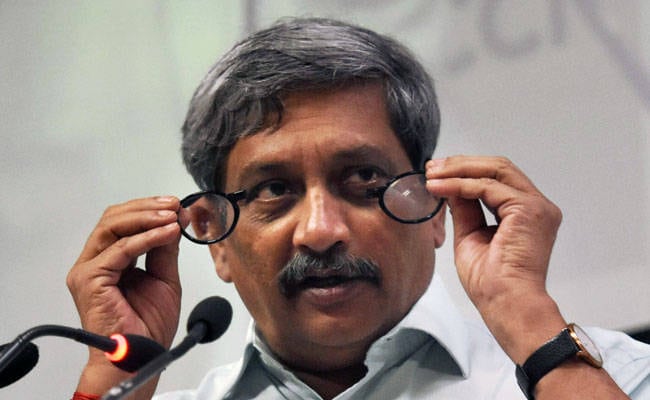
In the life of a politician the ultimate measure of success is electoral victories. But as the years turn into decades, the josh of those triumphs fades away. What remains - if they are fortunate - is the love, adoration and respect of the public. That is the barometer of contentment in public life. And proof that he enjoyed that in spades, was right there on the streets of Panaji on Monday, when thousands turned up to bid Manohar Gopalkrishna Prabhu Parrikar a final goodbye.
India has seen many successful leaders who have, individually or for their parties, won election after election. There are others who have been admired and cherished by their people. Few have been blessed with both. That is why Parrikar stood a class apart from most politicians of his generation.

Manohar Parrikar died on Sunday after a year-long battle with pancreatic cancer
I never really went to Goa on holiday. It never was an option as I would be there to report. I did so for over a decade. Such was the frequency of the visits that my colleagues dubbed Goa as my second home. I wasn't complaining.
That's how I met Manohar Parrikar. Memory fails me on our first meeting, but I do remember the feeling. I was overwhelmed. As a young reporter, I had heard tales of his legendary charisma and his inability to suffer fools. Both traits can be daunting, especially to a rookie.
It was on the campaign trail during an assembly election that I had a first-hand glimpse of Parrikar's simplicity and self-belief. All I had to do was to call him on his mobile and he would answer. I pitched in a request for an interview and we decided to meet on a picturesque street in Panaji where he would campaign and we could shoot our story.
Manohar Parrikar was cremated with full state honours at Panjim's Miramar Beach
Elections in Mumbai - as in most state capitals -- are loud and chaotic. Candidates wearing garlands ride atop customized SUVs and wave at crowds who eagerly wait for a filmstar to materialize. Tailing and surrounding the candidate's vehicle is a sizeable crowd of cadre armed with party flags and posters. Adding to the noise are supporters chanting unbelievable praises of their beloved leader in the hope of pulling in voters.
It couldn't be more different in Panaji. There Parrikar arrived on time, riding pillion on a bike. In his trademark bush shirt, trousers and chappals, he got off and started his campaign. There was no vehicle on which he could climb so that he could be in the spotlight. No garlands. No loudspeakers. No slogans. The "crowd of supporters" was some 15 people from the neighbourhood holding pamphlets of his manifesto. Parrikar would then go from home to home, chat up voters and share the pamphlets.
He was his own star. His manifesto and his word was his conviction. Nothing else mattered.

Over the last few months, Mr Parrikar made rare public appearances
With elections 2019 ahead, there is a debate around whether development is enough to win elections. Interestingly, Parrikar told me senior BJP leader LK Advani had asked him this question in 2002. "Will you get votes based on good governance," Advani had questioned. It was enough, said Parrikar.
There was another incident which was a happy surprise to me on a personal level.
In 2014, when Parrikar was summoned to Delhi to take over as India's Defence Minister, I went to Goa again and fixed up an interview with him. I was excited as I was among the first few journalists he would speak to after the big news. Just as I reached his official residence at Altinho in Panaji, an anchor and senior colleague from Delhi called him and asked for an interview. Parrikar probably saw the disappointment on my face. Then he said, "Tejas, you are in Goa and I know you. I don't know this person. Why should you not do it first?" The small gesture made my day because he was fair and he let me shine.

In January, the four-time chief minister had said he would "serve Goa till my last breath" (File photo)
I must mention here that people who never knew Parrikar claim that he was "forced" to remain Chief Minister as he was the only person who could keep the smaller allies with the BJP and therefore ensure the government's survival. Some others suggest that had he been allowed to retire and recuperate, he may have lived longer.
From whatever I - or those close to him - know of Parrikar - this is nonsense. Parrikar was a workaholic. He took his own decisions. Would it then be so surprising and far-fetched for someone who worked 16 to 18 hours a day to "continue working till his last breath" despite a losing battle with cancer?
Talking of Parrikar and his work ethics, it reminds me of the one thing that he insisted he wasn't - susegad - living the relaxed, laid-back Goan life.
(Tejas Mehta is former Bureau Chief, NDTV 24x7 and is now a political commentator.)
Disclaimer: The opinions expressed within this article are the personal opinions of the author. The facts and opinions appearing in the article do not reflect the views of NDTV and NDTV does not assume any responsibility or liability for the same.
Track Latest News Live on NDTV.com and get news updates from India and around the world

